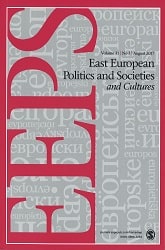Inequality in Poverty: Bulgarian Sociologists on Class and Stratification
Inequality in Poverty: Bulgarian Sociologists on Class and Stratification
Author(s): Pepka Boyadjieva, Petya KabakchievaSubject(s): Culture and social structure , Social development, Social differentiation, Social Theory, Post-Communist Transformation, Socio-Economic Research, Corruption - Transparency - Anti-Corruption
Published by: SAGE Publications Ltd
Keywords: class-based stratification; status-based stratification; multidimensional stratification; corrupt elites; poverty;
Summary/Abstract: The paper analyzes the variety of discourses on social inequalities in postcommunist Bulgaria. The focus is on academic discourse, but political and everyday interpretations are presented as well. Politicians generally avoid talking about social differences and prefer instead the dichotomy of “elite” versus “the people,” whose interests the politicians vow to protect. In popular consciousness, the main division is between “the rich” (mafia, politicians, ex-nomenklatura) and “the honest poor.” In sociology, three main research trajectories have emerged: from class-based to status-based stratification; from one-dimensional to multidimensional stratification; and from a Marxist class model to a social network model. Perhaps the most important characteristic of Bulgarian society is its high level of poverty, according both to income indicators and self-perception. In this context of a pervasive sense of poverty, status differences lose their significance. This in turn prevents the establishment of group or class solidarity, as everyone feels she or he is competing with all others. Starting in 2013, a new trend can be observed: of social protests organized by those who say they feel powerless and manipulated by corrupt elites. As they try to initiate new types of economic negotiations with the government, sociologists have a responsibility both to study this new movement and to push the problems it raises into public debate.
Journal: East European Politics and Societies
- Issue Year: 29/2015
- Issue No: 03
- Page Range: 625-639
- Page Count: 15
- Language: English
- Content File-PDF

